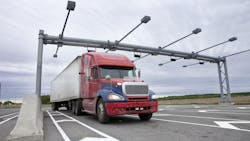There are millions of trucks on the road, and with only a few thousand inspectors. The Commercial Vehicle Safety Alliance has proposed lightening its members’ loads by requiring motor carriers to install electronic identification on their vehicles.
The Federal Motor Carrier Safety Administration, in an advanced notice of proposed rulemaking in the Federal Register, has asked for feedback on such a proposal, reigniting a longstanding debate between the purported benefits of such technology and its possible privacy, economic, and technological concerns.
The problem, according to CVSA, is one of bandwidth. Of the government and industry professionals that make up the alliance, 13,000 are commercial motor vehicle inspectors, conducting an estimated four million inspections per year. FMCSA estimates there are 12 million large trucks and buses traveling the nation’s roadways. Inspectors must be highly selective of which vehicles they examine because, for every vehicle they stop, that means other, possibly higher-risk trucks could pass by without being inspected.
An electronic ID mandate would theoretically allow one-way wireless communication from vehicle to inspectors, allowing them to know the IDs of all trucks in their vicinity. That ID would then be used to identify not only the motor carrier but the specific vehicle. The inspector would be able to see the vehicle and carrier’s safety records. This would, according to CVSA, allow safety personnel to assess which trucks in their area are most likely to need safety inspections, letting inspectors focus on the highest-risk vehicles while allowing lower-risk vehicles to continue unperturbed. It would also, according to CVSA, encourage safety compliance by allowing carriers to avoid inspections, saving time and fuel.
See also: Truck crashes happen. Then what?
CVSA Deputy Executive Director Adrienne Gildea said that, with current technologies, inspections are often kept to just trucks that are passing by weigh stations and other inspection sites. She said that the technology would allow CVSA to focus more closely on trucks that are at a higher risk of violating safety standards.
“What could happen is, a truck goes rolling by, an inspector runs that DOT number, waits for the information to come up, makes her evaluation, and in that time, other trucks have driven past that may have been a better target for an inspection,” Gildea said.
Gildea emphasized that CVSA is requesting electronic IDs transmit data one way. The IDs, most likely connected to the VINs, would offer inspectors no other information other than what commercial vehicles are in their vicinity. The inspectors would consult the same databases and have access to the same information they would using traditional inspection methods.
“It’s not a package of data. It’s just the universal ID, and with that universal ID, that goes into the systems and opens up all the other information just like we use the DOT number or the license plate number now.”
CVSA has not indicated what technologies should be employed in such a mandate, and it has lobbied for FMCSA to make a notice of proposed rulemaking for so long in part because the comment period would help establish what technology would be best suited for the job. CVSA has, however, proposed a list of requirements, including that the technology is unable to be deactivated.
See also: How safety directors create litigation firewalls for fleets
Outside of inspectors’ visual assessments, there are three main technologies used to identify vehicles for inspections. The first is optical character recognition (OCR) technology in cameras that allows them to be able to read license plates and DOT numbers. The second is transponder-based, where a vehicle’s transponder, when entering a geofenced area such as a weigh station, transmits data to an on-site computer. The third is app-based technology using wireless mobile data.
Transponder and app-based technologies are used by only about 13% of the interstate carrier population, according to FMCSA. FMCSA doesn’t require electronic IDs or transponders to be assigned to trucks but does provide grant funding to states for technology projects to do so.
Do electronic IDs identify too much?
Critics of the proposal most cite cost, privacy, and cybersecurity concerns as to why the FMCSA should not mandate electronic IDs for trucks.
The technology used for electronic ID communications would likely be installed in the manufacturing process. Any costs incurred by the manufacturer could then be passed on to carriers as they purchase trucks. There would also be the need to service and repair any communications devices. FMCSA denied a previous CVSA petition in 2013, stating it lacked the information necessary to estimate the costs and benefits of an electronic ID mandate.
President Todd Spencer of the Owner-Operator Independent Drivers Association wrote in a comment that “technology requirements always come at a cost, which is especially difficult for small carriers and owner-operators. Purchase, installation, maintenance, and service of devices would increase operating costs for all motor carriers without any proven benefit to efficiency or safety. Truckers are already experiencing elevated operating costs. There’s absolutely no reason to raise those costs even higher.”
There are also arguments, however, that electronic IDs could save carriers money. In a comment from Boyle Transportation, the company estimates fleets could save $165-$195 annually per long-haul truck.
The ability to track or see the confidential information of trucks with electronic IDs is also of concern to Federal Register commenters, with CVSA and FMCSA bringing up different parameters of what information could be broadcast. CVSA’s petition requested that the IDs transmit data only one way, to safety inspectors, and the only data point be the vehicle’s ID. However, FMCSA’s request for comments asked what kind of data should be included, such as GPS coordinates and driver information.
“The advanced notice of proposed rulemaking,” Gildea said, “asked questions about a lot of ideas that were related to universal ID, kind of overlap with universal ID, but are not universal ID.”
See also: Cybersecurity: 'White hats' offer tips to help execs head off hackers
In its comment, the American Trucking Associations recommended that the electronic ID only communicate the VIN but noted that “would create transaction data with associated timestamps, location data, or other sensitive data, which would need to be handled securely and have strict policies on data retention and data purging.” ATA also recommended that the ID only be broadcast on request by law enforcement or authorized inspectors, so trucks are not constantly broadcasting information that could be used to track it.
ATA also noted that, for electronic IDs to work, there would need to be a process where a VIN is assigned to a USDOT number, which would be “no insignificant burden” to carriers as they change vehicles regularly, whether through purchase or leasing.
The Truckload Carriers Association, in its comment, noted that the electronic ID mandate could potentially hurt compliant carriers. If certain carriers are routinely bypassed because inspectors are focused on high-risk vehicles or ones with zero inspections, those carriers would not receive credits for a clean inspection via FMCSA’s compliance safety and accountability program.
About the Author
Scott Keith
Scott Keith is a former fleet owner digital editor, who was on staff from 2022 to 2023.

